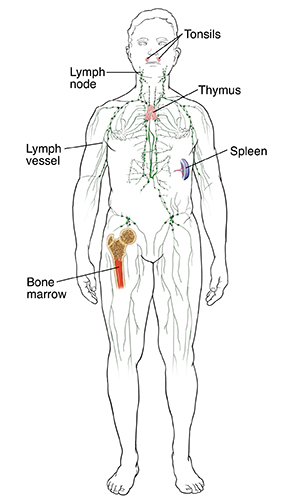Cancer starts when cells change (mutate) and grow out of control. The changed (abnormal) cells can form lumps of tissue called tumors. Lymphoma is cancer that starts in cells in the body's lymphatic system. Most cancers in the lymphatic system are non-Hodgkin lymphoma (NHL).
NHL has many different subtypes. It's important to know what type of NHL you have. Your health care provider can talk with you about this and what it means.
Understanding the lymphatic system
The lymphatic system is part of your immune system. It helps your body fight disease and infections. This system is a network of tubes, or lymph vessels, that pass through tissue all over your body. A clear fluid called lymph flows through the vessels. Small organs called lymph nodes are found along this network of vessels. Lymph nodes are found throughout the body. Some are grouped together in places like the neck, underarms, and groin. The lymph node is where your body's immune system springs into action against a foreign invader. It is normal to feel swollen or enlarged nodes in these areas when you have an infection. This is because your lymph nodes are making antibodies and immune cells perfectly tailored to fight the infection.
Some of the body’s internal organs are also part of the lymphatic system. These organs include the bone marrow, spleen, thymus, and tonsils. Other organs, such as parts of the digestive tract, also have lymph tissue.
When non-Hodgkin lymphoma forms
The lymphatic system reaches all over the body. So non-Hodgkin lymphoma can start almost anywhere in your body. Lymphoma can also spread from the lymphatic system to other tissues of the body. This spread is called metastasis.
Treatment choices for non-Hodgkin lymphoma
You and your health care provider will discuss a treatment plan that’s best for your needs. Your choices will depend on things such as your overall health, the type on non-Hodgkin lymphoma you have, how fast it's growing, and if it's causing problems. Treatment choices may include:
-
Radiation therapy. This uses focused rays of energy to kill cancer cells or keep them from growing.
-
Chemotherapy. This uses strong medicines to kill cancer cells.
-
Immunotherapy. These medicines help the body’s own immune system fight cancer.
-
Targeted therapy. This treatment uses medicines that target parts of cancer cells that make them different from normal cells. This means the medicines focus on and kill cancer cells, which limits damage to healthy cells.
-
Stem cell transplant. This treatment kills cancer cells with high doses of chemotherapy (and sometimes radiation). The high doses permanently kill the healthy blood and immune system cells, too. So after treatment, stem cells are given to rebuild the body's blood and immune system.
Featured in


